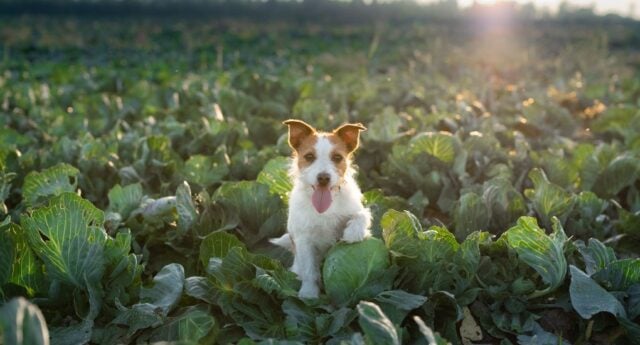
Table of Contents
Dogs are naturally omnivores. And with their smart minds, they are curious about all types of foods.
However, certain foods can be harmful to dogs. The question is—is cabbage one of them?
Can dogs eat cabbage? Absolutely! A lot of dogs love this leafy green vegetable.
Cabbage is safe to eat for dogs, but only in moderation. Dogs can get plenty of benefits when adding cabbages to their meal.
Cabbage is a common ingredient in a lot of recipes. It is also cheap and easy to make.
This blog will discuss everything you need to learn about cabbages for dogs. We'll also tackle the veggie's health benefits and potential risks.
Without further ado, let's get right into it!
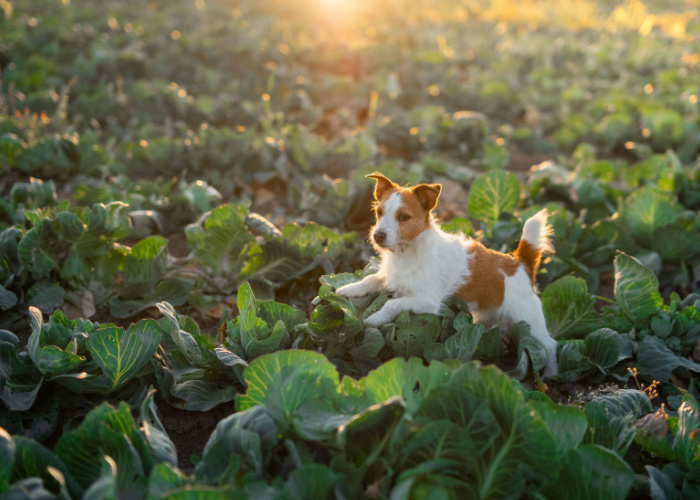
Can Dogs Eat Cabbage?
There are plenty of veggies and fruits that you can add to your dog's meal. But can dogs eat cabbage?
Cabbage is safe for dogs to eat. However, it comes with a gas warning, as it does for humans.
Cabbage is filled with nutrients, yet it is also low in calories. Still, your dog can surely benefit from adding cabbage to their meals.
The great thing about this leafy veggie is that it can be prepared in numerous ways!
This includes chopping up, baking, stuffing, and serving with kibble. Dogs and their parents can enjoy cabbage.
What Kind Of Cabbage Can Dogs Have?
Dogs can safely eat all types of cabbage. That includes green cabbage, red cabbage, savoy cabbage, napa cabbage, and bok choy.
Choose red cabbage if you plan to add some to your dog's meal. This is because red cabbages are more nutritious than green ones.
Red cabbages are higher in vitamin C and vitamin A.
Bok choy, a type of Chinese cabbage, is also filled with vitamin C, vitamin A, folate, and calcium.
Can dogs eat raw cabbage?
Dogs can eat cabbage in all forms, whether cooked or raw. But remember that cooked or pureed cabbage is more digestible.
Raw cabbage is still safe for your pup. However, it can be harder for them to chew on big leaves. That's why it's best to cut it into smaller pieces.
Health Benefits of Cabbage for Dogs
Are you planning to add more veggies to your dog's diet?
You're in the right place! These leafy greens are a great place to start.
Cabbages are safe and can be easily prepared in different ways.
You can give it as a treat, chop it and serve it with kibble, or bake it and stuff it with other safe ingredients. Fido will surely enjoy this delicious meal.
But other than those perks, cabbage is also filled with health benefits! It is a great source of important vitamins like vitamins K, C, B6, and B1.
It is also rich in healthy fiber and minerals such as manganese, copper, and potassium.
Best advised to consult with a pet nutritionist or your most trusted vet to know what other pet-friendly ingredients can benefit your pup.
Remember that cabbages should only be fed in moderation.
Small amounts of cabbage can help your dog’s health. Below, we've compiled a short list of the health benefits of cabbage for dogs.
Antioxidants
First, cabbages have antioxidants that help boost your dog's immune system.
It also helps reduce cell degeneration and cancer risk, heart problems, and other severe health conditions.
Fiber
This leafy green is also high in fiber. Dietary fiber can aid Fido's digestion and boost their overall gut health.
Vitamins and minerals
As discussed above, cabbage also contains vitamins and minerals such as vitamins C, K, potassium, and manganese.
Vitamins and minerals are crucial for dogs as they help maintain their energy levels and strong bones.
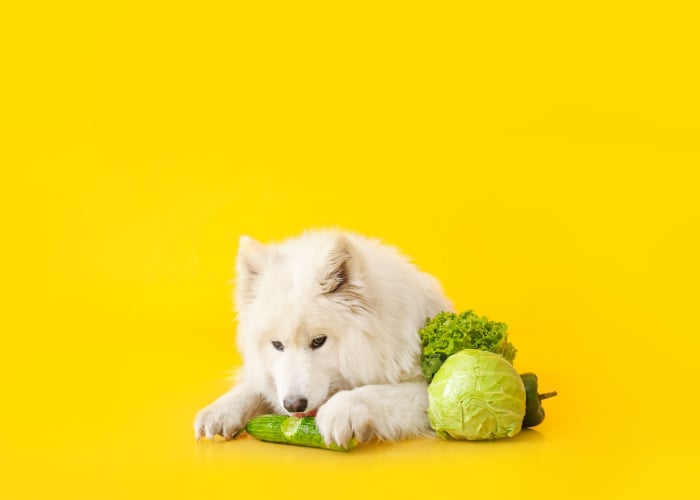
Risks Of Cabbage For Dogs
Remember what we said earlier? Cabbages should only be fed in moderation.
Too much of a good thing can lead to bad things.
Small amounts of cabbage can have positive effects on your pup. However, large amounts can lead to a few risks discussed below.
Constipation
Even though red cabbage has dietary fiber that helps a dog's digestive system, large amounts of this veggie can cause constipation.
Blockage in a dog's digestive tract can cause pain or discomfort. It can also lead to severe gastrointestinal problems.
Gastrointestinal upset
Another possible health risk when feeding too much cabbage is gastrointestinal upset. This leads to watery stools, excessive gas, and upset stomach.
That's why when it comes to introducing new foods to Fido, consult with your vet.
A good rule of thumb is not to let fruits or veggies exceed ten percent of your dog's daily calorie intake.
Hypothyroidism
A cabbage contains small amounts of thiocyanate. This is a natural compound in a lot of plants.
Even though dogs frequently filter out harmful levels of thiocyanate through urine, consistent exposure to this compound can damage the dog's thyroid gland, leading to hypothyroidism.
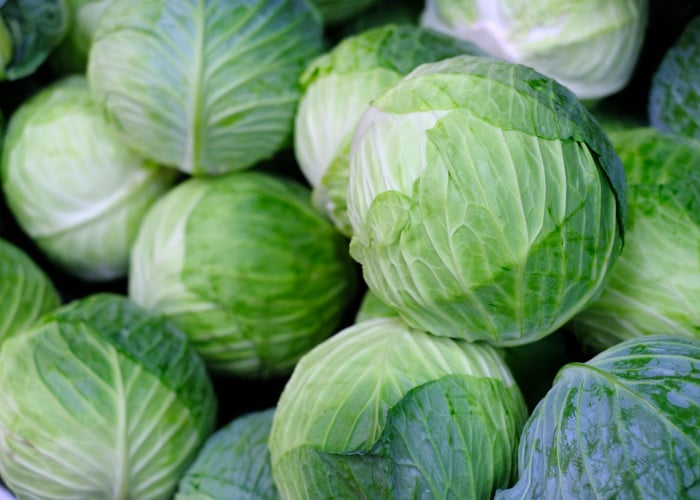
How to Safely Feed Your Dog Cabbage
Before introducing new food to Fido, you must consult your vet first.
Your vet can answer any questions, such as whether or not your dog can safely eat this food.
The vet can also help customize your dog's diet plan, including the proper amount of fruits, veggies, and other pet-friendly ingredients.
When it comes to feeding your dog cabbage, remember that small quantities of raw cabbage are still okay.
However, boiled or roasted ones without any seasoning or spices will be easier for dogs to digest.
If you want to feed your dog raw cabbage, wash the cabbage thoroughly and remove damaged outer leaves.
Then, chop it into small, bite-sized pieces before cooking or directly feeding it to them.
Start by giving them small portions, then work your way up after seeing your dog's reaction.
However, cabbages are not that appetizing all by themselves. Adding them to your dog's meal or partnering them with treats is better.
Other Vegetables and Fruits that are Safe for Dogs
Now, how about other veggies and fruits? Are other leafy greens safe for dogs to eat?
Plenty of vegetables and fruits are safe for dogs, but it's still important to consult with your vet first.
Below, we've gathered a short list of fruits and veggies that are safe for dogs:
Vegetables that dogs can eat
- Broccoli
- Celery
- Green Beans
- Cauliflower
- Lettuce
- Carrots
- Bell Peppers
- Cooked zucchini
- Brussel Sprouts
- Spinach
- Mushrooms
- Pumpkin
- Sweet Potatoes
Fruits that dogs can eat
- Apples
- Bananas
- Blackberries and Raspberries
- Blueberries
- Cantaloupe
- Cranberries
- Mango
- Orange
- Peaches
- Pears
- Pineapple
- Strawberries
- Watermelon
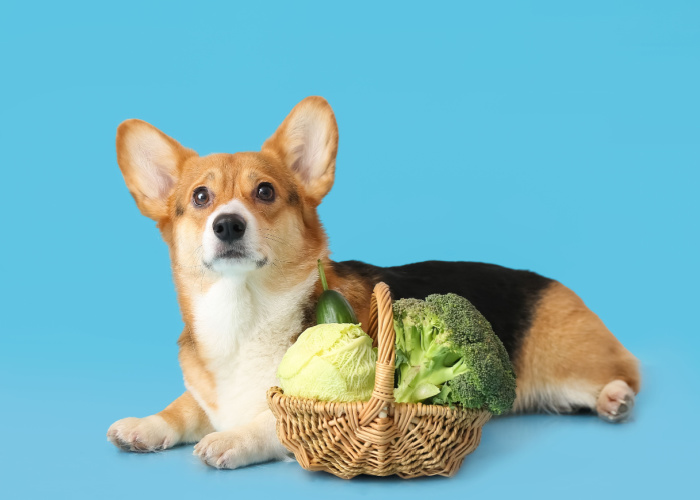
Frequently Asked Questions
Will cabbage upset a dog's stomach?
If given in large quantities, your dogs can get an upset stomach. Cabbages are filled with fiber.
However, too much fiber can cause stomach upset and watery stool.
Can dogs eat cucumbers?
Yes, cucumbers (in moderation) are safe for dogs to eat. Cucumbers are low in calories and can be an awesome crunchy treat for dogs to enjoy.
Sliced or diced cucumber can be a delicious snack for dogs. Just ensure to wash it thoroughly and cut it into thin slices.
ALSO READ: Can Dogs Eat Cucumbers? 10 Benefits and Side Effects
Is carrot good for dogs?
Yes, carrots, raw and cooked, are healthy for dogs. It can be a nutritious addition to your dog's meals.
Like cabbages, carrots are generally safe, but it is important to cut whole carrots into bite-size before feeding them to your dog.
ALSO READ: Can Dogs Eat Carrots: A Superfood For Fido
Can Dogs Eat Cabbage: Final Thoughts
Sometimes we can get a little tempted to share our plate with our furry best friends, but as pet owners, we should be aware of what our dogs cannot eat.
Some certain fruits and veggies can be harmful to dogs. But can dogs eat cabbage?
The answer is YES!
Cabbage can be a great addition to your dog's diet. This veggie can greatly benefit your pup as it contains antioxidants, fiber, vitamins, and minerals.
Boiled or roasted cabbage will be easier for dogs to digest. But if you plan to feed your pup raw cabbage, clean it first and slice it into smaller pieces.
However, remember that cabbages should only be fed in moderation. Cabbage is high in fiber, and too much fiber can cause constipation.
Large amounts of cabbage can also cause gastrointestinal upset and even hypothyroidism.












